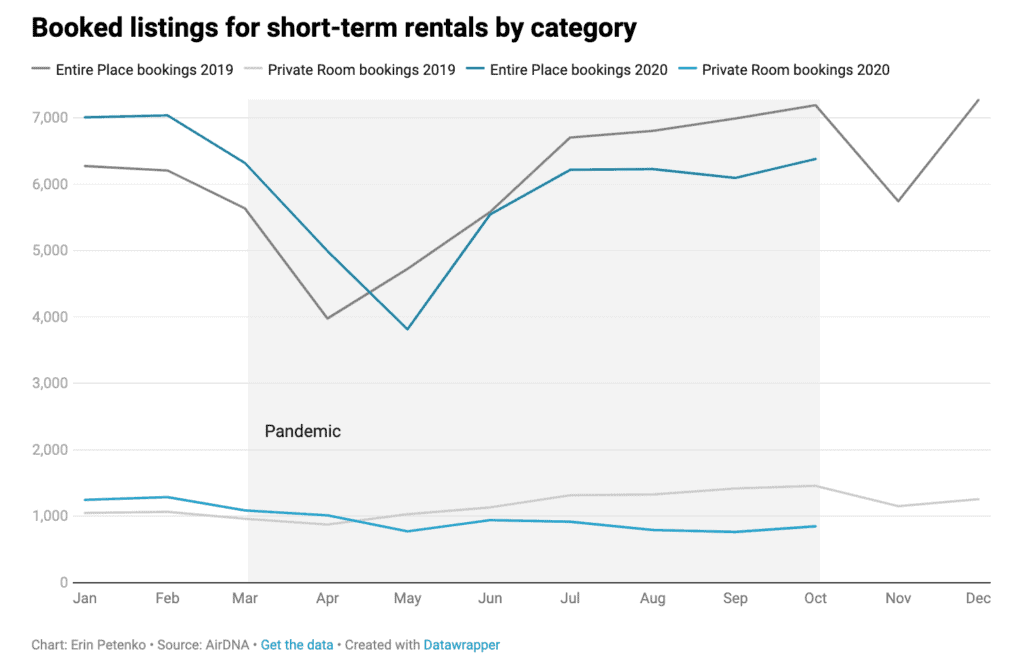
By Anne Wallace Allen and Erin Petenko/VTDigger
Reforming the state’s short-term rental regulations will be a top priority of the Vermont Chamber of Commerce in the coming legislative session. The association aims to level the playing field for members that operate traditional lodging businesses.
The chamber will ask lawmakers to establish a registration system for short-term rentals such as Airbnb and Vacation Rental By Owner (VRBO). While these rentals are subject to the same state rooms and meals tax that inns and hotels pay, they don’t have to register with the state, which means their compliance with rules is voluntary and the state doesn’t keep a list of owners to draw from for health and safety inspections.
Additionally, only conventional inns and hotels bear the cost of registration fees.
“When you add it up, it’s $2,000 for all the different licenses I pay, and I’m only an 11-room inn,” said Lynn Green, who owns the Four Chimneys Inn in Bennington. “There are many unlicensed vacation rentals that are big businesses, who own multiple properties and run it as a business, and have websites, etc., but they don’t have to pay the registration fees. And even though in theory they could be inspected, they’re not, in reality.”
Amy Spear, vice president of tourism for the Vermont Chamber, said the short-term lodging issue affects members in two ways: Short-term rentals remove worker housing from an already tight market, making it more difficult for employers to attract new hires to some areas of the state; and it creates unfair competition for traditional inns and hotels.
Last year, lawmakers commissioned a report from Dartmouth College researchers to learn more about how other states tackle the regulation of short-term rentals.
The report said about half of Vermont’s short-term rentals are administered through Airbnb. Vermont Airbnb hosts earned $15.1 million during the “biggest weekends” of 2019, the authors wrote. Notably, the study found that nearly 80% of Airbnb and VRBO listings were for complete homes for rent — showing the extent of the impact that short-term rentals are having on the housing market.
Tackling a shortage of affordable housing is a priority for the Chamber because it makes it more difficult for employers to find workers.
“Several studies have really laid the foundation for there to be action; there are policy options laid out for legislators to look at,” Spear said. “There’s an unlevel playing field for licensed properties and missed revenue for the state.”
The public health impact during Covid is also a factor, Green said.
“The whole time we were shut down last spring, it was very clear that the Airbnbs around the corner had people staying there,” she said. “People were parked there from Pennsylvania, New York. They were able to operate when we weren’t.”
The chamber is likely to find a receptive audience in the Senate Committee on Economic Development, Housing and General Affairs, which requested this year’s Dartmouth College report to learn more about options for regulating the new industry.
Sen. Michael Sirotkin, D-Chittenden and chair of the committee, said the Legislature has already enacted measures “to better identify these units and to make sure tax and inspection laws are complied with for both short- and longer-term rentals.”
The committee plans to make additional improvements this session, he said.
It’s difficult to assess accurately how the short-term lodging market in Vermont has fared in the pandemic, in part because many traditional lodging businesses also advertise rooms on short-term rental websites. AirDNA, a Denver company that analyzes the short-term rental market nationally, released a combined market summary in November of Vermont’s Airbnb and VRBO market that showed all rooms and meals tax revenues plunged last spring before recovering to about half of their original levels in the autumn.
That drop was not equal among all properties. Bookings for private rooms dropped 25% from March to October compared to the year before, while bookings for an entire home or apartment, which are often rented out through vacation rental websites, fell only 4% for that time period.
In comparison, data on the meals and rooms tax this year — which applies to short-term rentals, but includes traditional lodging as well — showed a drastic drop compared to 2019. Revenue from the room tax fell 94% in April compared to the year before, although preliminary data suggests that revenue began to recover in the fall.
State officials have said the hospitality industry is the sector hardest hit by shutdowns associated with the pandemic. Business hasn’t improved much now that they’ve been allowed to open to full capacity because guests flying in from out of state must quarantine for two weeks after they arrive. Or if they have traveled by personal auto and drive directly to Vermont, visitors can quarantine before they arrive. (Visitors can also shorten their quarantine with a negative PCR test after a 7-day quarantine.)
“Airbnb and vacation rentals have had a kind of banner year here in Vermont, while the rest of us have had to completely close at some point and operate under severe restrictions the rest of the time,” Green said. “Across the board, if they could just be treated like businesses, everything would be fine. It was one thing when it was just Grandma renting out a bedroom, but it’s not Grandma renting out a bedroom anymore.”




